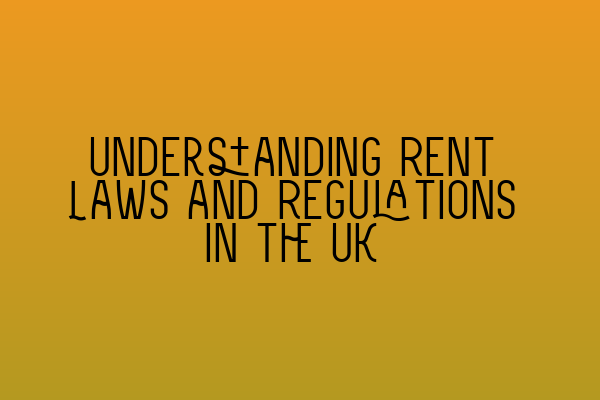Understanding Rent Laws and Regulations in the UK
As a property owner or tenant in the UK, it is crucial to have a comprehensive understanding of the rent laws and regulations that govern the rental market. Being aware of these laws not only protects your interests but also ensures a fair and lawful rental agreement for both parties involved. In this article, we will explore some key aspects of rent laws and regulations in the UK and provide you with the necessary knowledge to navigate this complex field.
Types of Tenancies
Before delving into the specifics of rent laws, it is important to understand the different types of tenancies in the UK. The two main types are:
- Assured Shorthold Tenancies (ASTs): These are the most common type of tenancies in the UK and provide tenants with a minimum period of 6 months to reside in the property. ASTs offer some legal protections to both tenants and landlords.
- Regulated Tenancies: Regulated tenancies were more common in the past and offer tenants increased security of tenure. These tenancies are typically long-term and provide tenants with the right to remain in the property indefinitely.
Understanding the type of tenancy you have is crucial as different rules and regulations may apply depending on the type.
Rent Increases and Rent Control
In the UK, landlords generally have the right to increase the rent; however, there are certain rules and restrictions in place to protect tenants.
For ASTs, landlords must provide a written notice informing tenants of any rent increases. The notice period should be at least one month, or longer if specified in the tenancy agreement. It is important to note that during the fixed term of the tenancy, the landlord cannot increase the rent without the tenant’s agreement.
In certain areas of the UK, rent control measures may be in place. For example, in areas designated as Rent Pressure Zones (RPZs), landlords are limited in the amount they can increase the rent each year. These measures aim to prevent unaffordable rent hikes and provide stability for tenants in high-demand areas.
Deposits and Tenancy Deposit Protection
When renting a property in the UK, landlords often require tenants to pay a deposit as a security against any damages or unpaid rent. It is mandatory for landlords to protect these deposits in a government-approved tenancy deposit scheme. This ensures that tenants’ deposits are secure and can be disputed through an independent dispute resolution service if needed.
Tenants should receive information regarding the deposit protection scheme within 30 days of the deposit being received. Failure to comply with these regulations can result in penalties for the landlord, including significant financial penalties and the inability to serve a valid notice to evict the tenant.
Evictions and Rent Arrears
In situations where tenants fail to pay rent, landlords have the legal right to evict them. However, the eviction process must follow the proper legal procedures. Landlords must serve a Section 8 or Section 21 notice to evict a tenant, depending on the circumstances of the eviction.
It is essential for landlords to adhere to these notice requirements and seek legal advice if necessary. Failure to do so can make the eviction process invalid, leading to additional costs and delays. Tenants facing eviction should also seek legal advice to understand their rights and potential defenses.
Conclusion
Understanding rent laws and regulations in the UK is crucial for both landlords and tenants. By familiarizing yourself with the different types of tenancies, rent increase rules, deposit protection, and the eviction process, you can protect your rights and avoid legal complications.
To further prepare for the SQE exams, check out our related articles:
